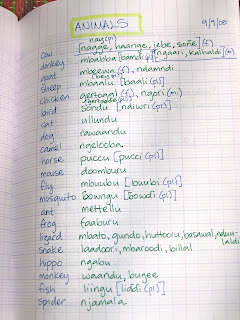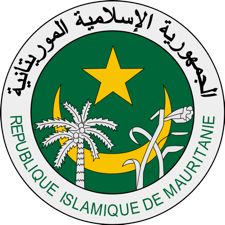Unsurprisingly, there is no universal "Peace Corps experience." I think often about how different my service might be if I were in a country where people speak English (Nigeria, The Gambia) or where the color of my skin did not automatically set me apart from the locals (Eastern Europe). In some places, Peace Corps gets the nickname "Posh Corps," but there is little about my experience that might be mistaken for posh. Among past and current PCVs all over, I repeatedly hear Mauritania referred to as "one of the toughest" places to serve. I guess it's a combination of things: the climate is oppressive, the dress is very conservative, alcohol is illegal, and we lack a range of amenities and infrastructure that you can find in other developing countries.
What is my life like? I have been drawing some comparisons...
It's kind of like college. All my life's possessions are in one room (including food). I don't study or do laundry as much as I probably should. I'm far from the old friends I know so well. Alcohol is forbidden. I get care packages (thank you!!!). Easy Mac is gourmet living.
It's kind of like being elderly. I go to bed early and get up early. I spend a fair amount of time reading and doing crosswords. I sometimes don't have control of my bowels (yikes). And I talk to everyone around me about past experiences in this far-away world that they don't know and likely never will.
It's kind of like camping. I sleep outside in a tent. I squat to pee. I cook over a fire.
It's kind of like being OCD. Near EVERYTHING in my room is inside plastic bags. I sweep my floor and wash my hands incessantly.
It's kind of like being a child. I take afternoon naps. I pick up toads [to get them out of my room!]. I play dress-up, or it feels like it anyway. I kill bugs for fun. I eat with my hands.
It's kind of like being a nurse. I daily self-dispense my meds and vitamins. I am vigilant in observing the bug bites and/or rashes I constantly get. I always inspect my poop for any signs of problems -- how many consecutive days of diarrhea has that been? Do I see blood, or mucus? And when I often have dull cramps, I have to diagnose the cause -- did I eat or drink something contaminated? Am I reacting to the anti-malaria meds? Do I need to run to the toilet immediately, or can it wait?
Posh, right? ;)
I often recall Will Ferrell in Zoolander: "I feel like I'm taking CRAZY PILLS!" I mentioned something to a local colleague about missing electricity, and he asked in all seriousness what I would need it for. And then on the subject of food alone: a legit dinner I was served one night consisted of hot macaroni in a soup of sugar milk. Can you imagine? Meanwhile, most people think it's absurdly hilarious when I say that Americans often eat sandwiches for lunch. Everyone knows that rice and fish is what you eat for lunch, obviously. They also can't believe that many Americans eat dinner at 5 or 6 p.m. "But what do you eat at NIGHT?!" (Here they serve dinner anywhere between 8 and 10:30, depending who you eat with.)
But it is good. I am so grateful to be able to see how these people really live -- and even so, though I am living without electricity or indoor plumbing, I know that I am not at all living the life of a villager. I try to be on their level, but I have my fancy water filter and American skin creams and medicines and beautiful books, not to mention my iPod and computer. I often look at my sturdy Chaco sandals sitting in the dirt next to the Africans' cheap plastic flip-flops, and I ponder that one could buy a baguette roll of bread here every day for a year and a half -- or this pair of pretty shoes.
School began on October 19, ALHAMDULILLAH (thank God)! And contrary to what I had heard, students really did show up for the first week of class. I had expected to have around 12 hours of teaching per week, but unfortunately I currently only have 6. It may change, but in the meantime this gives me plenty of time to create and implement my secondary projects in the community. I am teaching 1st-, 2nd-, and 3rd-year students of collège, somewhat equivalent to 7th, 8th, and 9th grades in the U.S. Two of my classes have about 55 students, and the other has 75. There are more boys than girls, but I am encouraged by how many girls I did see. We are very fortunate in Dar El Barka to have a new middle school compound this year. The desks are ample, and the blackboards are wide and clean. I am very grateful! The first days of class went quite well, and I am really excited about the year.
(P.S. Thank you so much for your personal emails and comments. Unfortunately, I am not able to reply today because the internet connection is even more painfully slow than its usual snail's pace. But I will answer you all eventually!)
Saturday, October 25, 2008
Saturday, October 11, 2008
Pulaar ine weli kay
 I live in a village where everyone's* mother tongue is Pulaar. Varieties of this language (under an umbrella called Fula) are spoken throughout West, Central, and East Africa by 25 million speakers. My strand is essentially understood in Mauritania, Senegal, and The Gambia.
I live in a village where everyone's* mother tongue is Pulaar. Varieties of this language (under an umbrella called Fula) are spoken throughout West, Central, and East Africa by 25 million speakers. My strand is essentially understood in Mauritania, Senegal, and The Gambia.[* = Everyone with the exception of the hakem, who is the first-in-command sovereign bigwig of Dar el Barka. Like the vast majority of political higher-ups in Mauritania, he is a Moor and thus speaks Hassaniya, a dialect of Arabic. From what I can tell he barely knows any Pulaar at all -- nevermind that, meanwhile, few of the villagers communicate in Hassaniya. But why on earth would one ever need to SPEAK with the people he governs? I digress.]
Everyone who has been to school also speaks the colonial language of French, to some degree. This is therefore my fallback when I can't get my point across in Pulaar; we both stumble along in a language neither of us particularly excels in, but it often gets the job done. By necessity, Pulaar frequently borrows words from French where the concept has not existed in traditional society -- terms relating to technology, medicine, commerce. Examples include: cell phone, battery, bank, school, bandage, store, bathroom, paved road, car, gun, alcohol, sweater, electricity, law, rent, clock, faucet, table, plate, vote.
As a perpetual student of linguistics, I am intrigued by the way our minds choose our words and conversely how language can shape our thoughts (psycholinguistics). Interesting finds in Pulaar:
- The word leydi means country, land, nation, ground, sand, and floor. So to ask people where they're from, you ask, "What is your sand?"
- The generic word for "medicine" is the same for "trees."
- Rather than having separate words for "sister" and "brother," there are only "older sibling" and "younger sibling" (each of which you can specify as male or female). Birth order is more important than gender.
- The same word is used for "to like" and "to want," thus rendering it hard to compliment your friend's possession without insinuating that you want to take it from him.
- "Airplane" is literally "flying boat."
- The word fesaade means "to be intelligent"; it is also used for "to be vaccinated."
 Pulaar lacks the nuances and complexity of English -- no subordinate clauses, no past perfect progressive -- but Pulaar speakers are so much more concise. They have single words that mean, for example: "to remember and say something during a meal," "to feel sand grains while chewing" (more common than I'd like), "a person with a lower lip smaller than the upper lip," "to leave one's husband's compound after a dispute," "to dig holes for sowing a second time," and the ever-useful "a death message broadcast on the radio" (I'm not really sure yet on the usage of that one).
Pulaar lacks the nuances and complexity of English -- no subordinate clauses, no past perfect progressive -- but Pulaar speakers are so much more concise. They have single words that mean, for example: "to remember and say something during a meal," "to feel sand grains while chewing" (more common than I'd like), "a person with a lower lip smaller than the upper lip," "to leave one's husband's compound after a dispute," "to dig holes for sowing a second time," and the ever-useful "a death message broadcast on the radio" (I'm not really sure yet on the usage of that one).Also, it is near impossible to make a statement in the future tense without adding the Arabic inshallah (or Pulaar's borrowed version so Allah jaɓi), meaning "if God wills it." When I say to my family that I'm going home to rest but I'll be back for dinner, they all murmur, "Inshallah, inshallah." In fact, in Pulaar "if" and "when" are the same word: "Every morning, if I wake up, I get dressed." I guess you never do know.
School was originally supposed to begin October 5th, but God didn't will it. Between the coup and Ramadan and lingering unresolved teachers' strikes, the start date is now "October 12th, inshallah." I've heard rumors we may not begin until November...
Subscribe to:
Comments (Atom)

